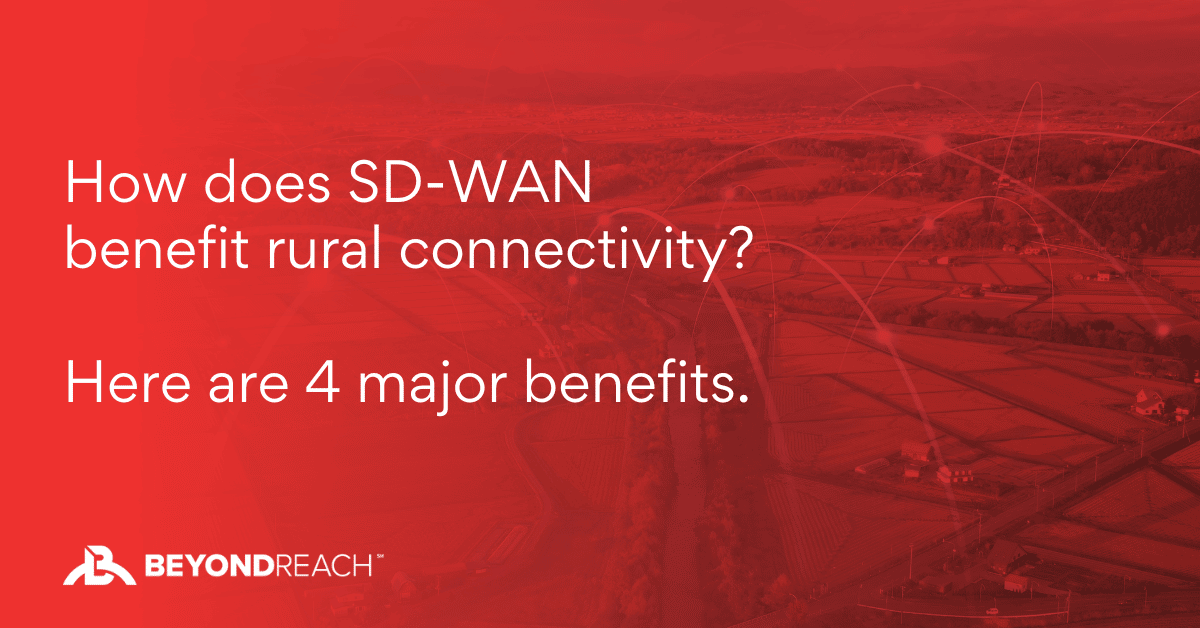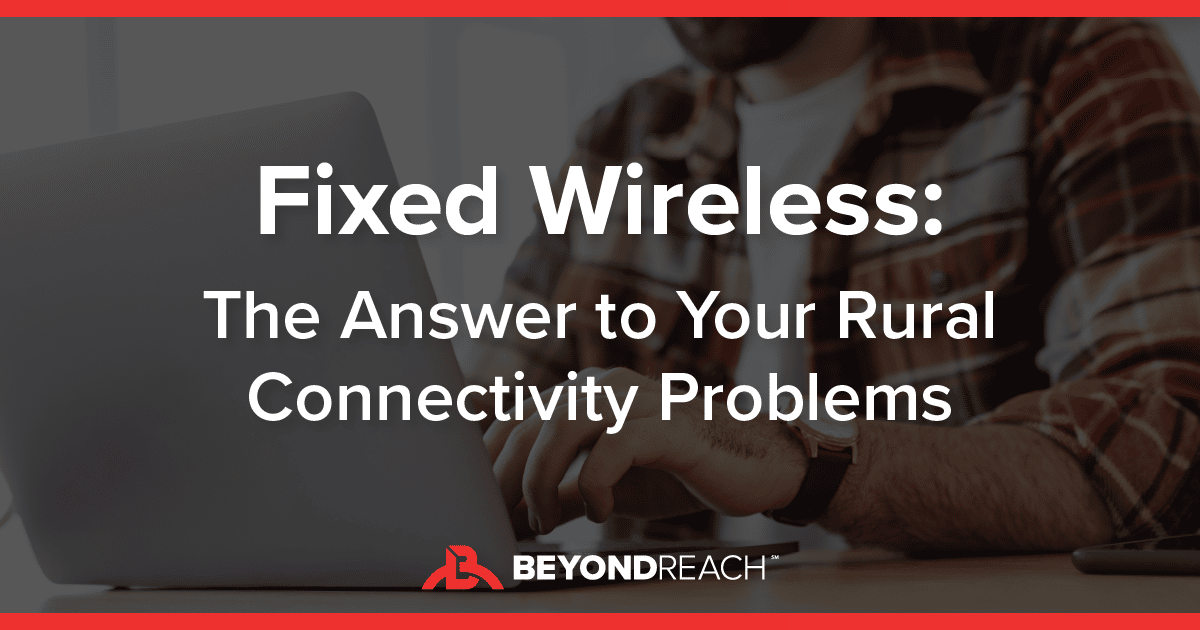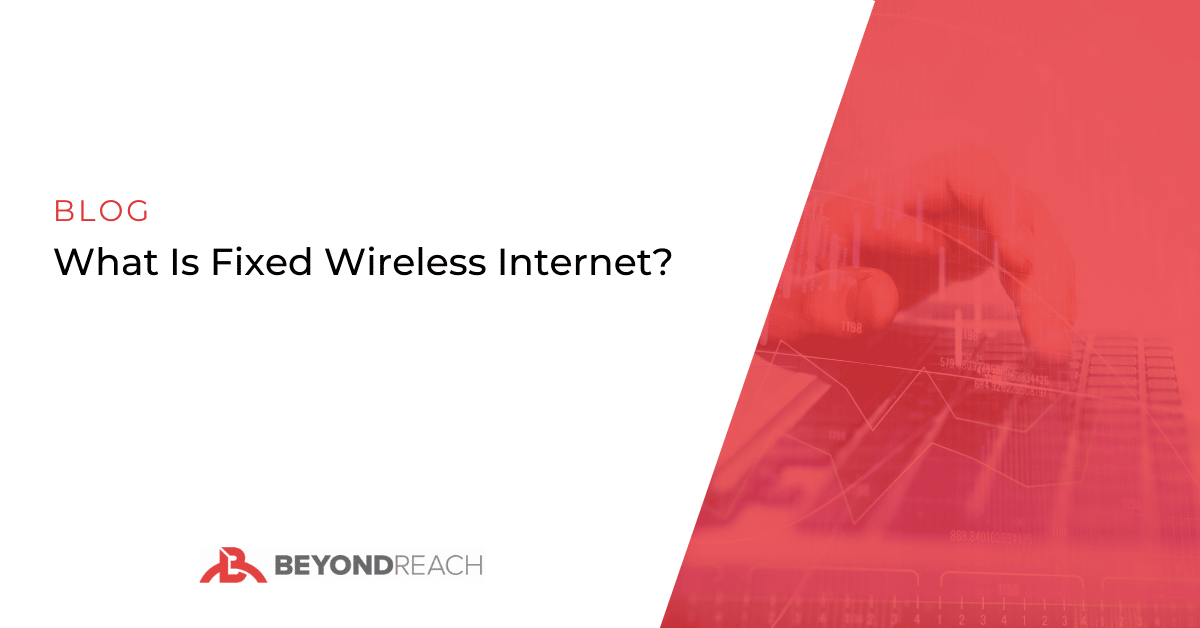The Future of Fixed Wireless: A Five-Year Look Ahead to How Fixed Wireless Will Help Shape the Future of Internet Connectivity
High-speed internet connectivity has become indispensable to human society. Whether you're communicating with customers, managing field sales reps, or onboarding new employees, a stable internet connection is essential.
While many broadband internet options are available in the market, fixed wireless internet has risen to the forefront. In this blog, we'll dive into the future of fixed wireless and understand whether it'll live up to the hype.
What Is Fixed Wireless Internet?
Fixed wireless technology uses radio waves transmitted from a base station to provide internet connectivity. A receiver (antenna) is installed outside a client's building/premises and connected to a router through a cable. It receives internet signals from the wireless base station and passes them along to the router.
For end-users, connecting to fixed wireless internet is the same as linking a device to a WiFi router. Additionally, fixed wireless speed is comparable to cable and fiber optic internet. But what sets it apart from other technologies is the ease of deployment.
Common Concerns About Fixed Wireless
While fixed wireless internet offers several benefits, it's associated with several misconceptions. The most common concerns surrounding fixed wireless include its:
- Reliability
- Scalability
- Security
Some businesses worry that bad weather will interfere with the performance of fixed wireless internet. It's worth noting that while adverse weather has the potential to slow down fixed wireless internet, that's rarely the case with a good provider.
However, reputable fixed wireless providers use carrier-grade equipment and advanced technology to counter interference caused by rain, fog, hail, snow, etc., which makes it one of the most reliable internet connectivity technologies on the market. Other options, including cable and fiber, are more likely to falter during extreme weather events and natural disasters.
Fixed wireless internet also offers the same level of security as other broadband connections. The simplicity and lower cost of implementation make it easy to add new users or increase speeds as well.
Benefits of Fixed Wireless
Apart from lightning-fast internet speeds (ranging from 3 to 1,000+ Mbps), fixed wireless boasts high bandwidth and low latency, it's also more reliable and stable than DSL or cable broadband.
One of the biggest benefits of fixed wireless is its ease of implementation. It doesn't require service providers to lay down underground phone lines or cables, nor does it require them to create extensive infrastructure for lighting fiber optic cables. That makes it possible for ISPs to provide internet connectivity to hard-to-reach locations and rural areas at a much faster rate than fiber.
Our whitepaper explores how fixed wireless internet helps businesses – especially those in remote and rural areas – overcome connectivity challenges in more detail. Download your free copy today to learn more.
Who Uses Fixed Wireless?
Fixed wireless internet is suitable for both residential and commercial use. It's particularly useful for businesses and consumers in rural areas. It can help bridge the digital divide that limits people in these locations from accessing information and utilities in a few simple clicks.
The Future Scope of Fixed Wireless Internet
There's been plenty of speculation about how long fixed wireless technology will survive, and whether it can overtake broadband services. The good news is that the fixed wireless access (FWA) market is projected to grow at a CAGR of 73.4%1 between 2021 and 2026.
Across the globe, service providers have also realized the benefits of fixed wireless offers. That's the reason FWA net adds have increased 158%2 since the first quarter of 2020.
It comes at a time when users are already frustrated with low bandwidth, limited data caps, and sluggish speeds of cable broadband. Then there's the problem of asymmetrical internet connections with dwindling uplink speeds. While fiber internet overcomes many of these drawbacks, it's expensive in the long run.
Businesses and households alike will likely gravitate towards fixed wireless in the near future. If you're wondering whether fixed wireless will stand the test of time, the numbers are in its favor. It isn't surprising considering the advantages fixed wireless offers over other internet connectivity options.
Fixed Wireless Is Poised to Achieve Sustained Growth
The outstanding benefits of fixed wireless internet aren't the only factors contributing to its growth. Here are a few other reasons experts expect fixed wireless to attract more users and service providers:
The Rise of 5G
Fixed wireless internet speeds are already higher than those of other broadband connections. With direct internet access (DIA), it can offer even faster speeds of up to 20 Gbps.
But the advent of 5G technology creates new possibilities for fixed wireless internet. The 5G spectrum allows fixed wireless internet providers to offer sky-high speeds at reasonable costs. Initial rollouts of fixed wireless 5G networks have already demonstrated average speeds between 500 and 600 Mbps. With advancements in 5G technology, users can expect speeds between 1.1 and 1.2 Gbps to become the norm.
Increased Adoption of Remote Work
The COVID-19 pandemic has compelled businesses to embrace a hybrid workforce. Employees who can work remotely may move to smaller towns – or even rural areas and other hard-to-connect locations.
This escalates the demand for high-speed, reliable, and cost-effective internet connectivity in remote areas, and traditional broadband connectivity options won't make the cut. That's where wireless internet service providers (WISPs) can step into the picture with fixed wireless. As the adoption of remote work grows, so will the demand for fixed wireless.
Public Awareness About the Digital Divide
The digital divide between rural and urban areas isn't a secret, but the pandemic brought it into the limelight. The FCC estimates that 6.5% of the U.S. population3 (more than 21 million Americans) don't have access to the internet.
A study by BroadbandNow reveals that the FCC data is conservative at best. The findings indicate that nearly 42 million Americans4 don't have a broadband connection. Worse still, more than 83 million U.S. consumers5 lack the freedom to choose from different broadband providers.
The good news is that the digital divide has finally caught the attention of policymakers. That means they will actively invest in providing equal internet access to consumers irrespective of their locations, putting the odds in favor of fixed wireless.
Why Will Users Choose Fixed Wireless Over Other Broadband Services?
Apart from the lightning-fast speeds and low latency, fixed wireless addresses several pain points users face with DSL, cable, and fiber internet.
It's cumbersome and expensive to deploy these technologies in remote areas, and it doesn't make sense for service providers to install cable or fiber infrastructure in a location with very few customers. Even if they decide to build the infrastructure, it'll be time-consuming and expensive.
The demand for high-speed internet won't be restricted to cities since students and workers living in rural areas will also want reliable broadband connections. Fixed wireless is the most suitable option considering the drawbacks of other internet technologies in these areas. Widespread 5G implementation will further boost fixed wireless speeds and encourage users to choose it over cable or fiber optic internet.
Challenges in Fixed Wireless Implementation
With the advent of 5G technology, fixed wireless providers will likely use the ultra-high frequency mmWave spectrum (above 20 GHz). While these high-frequency signals boast excellent speeds, they have low penetration power.
This, in turn, deals a blow to fixed wireless availability, particularly when a user is indoors. Building materials that block radio signals can further exacerbate these problems. For instance, low-emissivity glass, used to block thermal radiation, can degrade signal quality.
Service providers can use a technique called beamforming to work their way around the challenges of the mmWave spectrum. It involves using specialized antennas that turn radio signals into a razor-sharp beam. Similarly, installing robust outdoor routers will help overcome the challenges posed by building materials. Fixed wireless experts will have to offer alternative solutions where users can see similar speed and performance – without the limitations of 5G mmWave issues.
The Future of Fixed Wireless Shines Bright
To say that fixed wireless internet will grow in the next five years would be an understatement. As remote work becomes the new standard, more businesses and consumers will choose fixed wireless in favor of other broadband technologies. Integrating 5G and fixed wireless will also help bridge the digital divide.
It is, however, crucial for service providers to overcome the technical challenges of implementing fixed wireless. That's where sophisticated antennas and routers will come in handy.
Want to get a fixed wireless connection for your business? Contact BeyondReach today to get started.
Sources:
- https://www.mordorintelligence.com/industry-reports/fixed-wireless-access-market
- https://www.ericsson.com/en/blog/2020/9/fwa-could-be-the-best-growth-opportunity-in-telecoms-right-now
- https://www.fcc.gov/reports-research/reports/broadband-progress-reports/2019-broadband-deployment-report
- https://broadbandnow.com/research/fcc-underestimates-unserved-by-50-percent
- https://ilsr.org/report-most-americans-have-no-real-choice-in-internet-providers/










